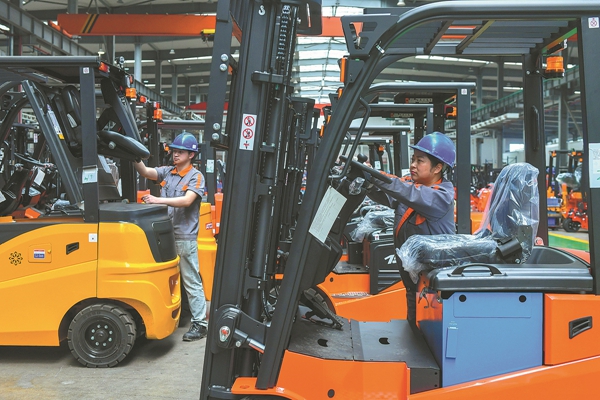Plants see April blip on tepid buying
 0 Comment(s)
0 Comment(s) Print
Print E-mail China Daily, May 5, 2023
E-mail China Daily, May 5, 2023

Employees work at a production line of new energy delivery vehicles at a company in Huzhou, Zhejiang province. [Photo/China Daily]
China's factory activity contracted for the first time in three months in April, mainly hurt by softer domestic demand, a private survey said on Thursday.
Analysts said the drop indicates that the world's second-largest economy has yet to gain a solid footing amid pressure from insufficient demand and tepid confidence, saying more focus should be placed on boosting domestic demand and increasing support for market entities.
The Caixin China General Manufacturing Purchasing Managers' Index — which gauges operating conditions in the sector — fell to 49.5 in April from 50 in March, below the 50-point mark that separates contraction from growth, media group Caixin said in a report.
Softer demand conditions were a key factor weighing on the performance of the sector, with total new orders falling slightly for the first time in three months, the report said.
Referring to the 12-month outlook for output, manufacturers polled by Caixin expressed the second-strongest optimism in two years, supported by hopes that consumer demand will pick up and drive growth in output in the months ahead.
"Manufacturing supply ticked up marginally, but demand contracted," said Wang Zhe, senior economist at Caixin Insight Group. "While the economy continued to recover in the post-COVID-19 era, the rebound was weaker than expected."
According to the Caixin report, the subindex for output came in only slightly above 50, and domestic demand became a main drag, with the subindex for total new orders falling back into contraction.
While the gauge for new export orders remained stable as more COVID restrictions were lifted, external demand remained limited, Wang said.
Citing the recently released official first-quarter economic data, Wang said that the stronger-than-expected official data suggest China's economy was recovering at a rapid clip after the country optimized COVID-19 controls, yet it remains to be seen if the rebound is sustainable after a short-term release of pent-up demand.
Wang said the manufacturing PMI in April indicates that economic recovery has yet to find a stable footing, as growth still faces challenges, including employment and deflation pressure.
"In the future, relevant policies should focus on expanding domestic demand, stabilizing employment and improving expectations, as well as improving the monetary transmission mechanism and creating a virtuous circle of economic development," Wang added.
Data released by the National Bureau of Statistics on Sunday also offer the latest official snapshot of the multiple pressures facing the economy, as the official PMI for China's manufacturing sector stood at 49.2 in April, down from 51.9 in March.
The country's official composite PMI, which includes both manufacturing and nonmanufacturing activities, came in at 54.4 compared with 57 in March, said the NBS.
Notably, NBS data showed the reading for manufacturers' expectations for future output and business operations came in at 54.7 in April, expressing confidence in a post-pandemic recovery.
Zhou Maohua, an analyst at China Everbright Bank, attributed the contraction in April factory activity to insufficient domestic demand and still weak external demand, saying some manufacturers will continue to face challenges from weak demand, high input costs and financing difficulties.
Zhou called for more efforts to further spur consumption, promote the recovery of domestic demand, launch targeted measures to ease burdens and support the development of market entities.
A meeting of the Political Bureau of the Communist Party of China Central Committee held last week stressed that currently the key for the economy to steadily recover and pick up relies on the recovery and expansion of demand, saying current economic improvement is mainly restorative, with endogenous driving force still weak and demand insufficient.
Louise Loo, an economist at British think tank Oxford Economics, said the meeting reiterated the pro-growth policy stance, even as GDP growth surprised on the upside in the first quarter.
"We continue to expect policies to stay accommodative as-is this year, until the recovery is entrenched," Loo said.






Go to Forum >>0 Comment(s)